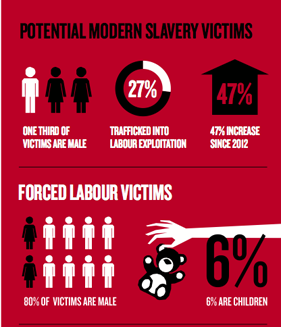Slavery in tourism

UK Home Office launches information campaign
The Home Office launched its Modern Slavery campaign in the summer and they are talking to the tourism and hospitality industry helping them to spot the signs of slavery.
Says the Home Office modern slavery can take many forms including the trafficking of people, forced labour, servitude and slavery. Recent statistics show that 27% of potential victims are trafficked into labour exploitation.
Traffickers and unscrupulous recruitment agencies target a range of industries including those involved in hospitality.

With the hospitality sector employing over 2.4 million people and contributing over £34 billion to the UK economy, traffickers and organised criminals are looking for opportunities to exploit the industry.
In 2013, 1% (7 victims) of forced labour victims referred to services came from the restaurant or bar sector, and 41% of victims were trafficked for sexual exploitation, with 4% (44 people) sexually exploited in hotels. While the numbers coming to light are small, the hidden nature of this crime meansactual numbers are likely to be much higher.4
Anyone can become a victim of modern slavery. However, victims of this crime in the hospitality sector are often Eastern European men and women who are promised a job in the UK and then forced by traffickers to work for little or no money. Through threat, violence or coercion they may be forced to live in squalid accommodation and have their identity documents taken from them.
Says the Home Office: All hotels and restaurants should make proper background checks on the agencies who supply them with labour, including where the agency is operating in a supervisory role.
Signs to spot victims:
- Legal documents: Is the person in possession of their legal documents (passport, identification and their own bank account details) or are these being held by someone else? Victims will often be forced to use false or forged identity documents.
- Pay: Are there a group of workers who have their wages paid into the same bank account? This may be sign of the illegal gangmaster collecting all their wages. Are they having wages taken off them for accommodation, food or to repay supposed debt?
- Transport: Are a group of workers dropped off or picked up at unusual times of the day, are they all taken to the same property?
- Appearance: Does the person look malnourished, unkempt, or appear withdrawn? Are they suffering physical injuries? Do they have few personal possessions and often wear the same clothes? What clothes they do wear may not be suitable for their work.
- Behaviour: Is the person withdrawn or appear frightened, unable to answer questions directed at them or speak for themselves and/or an accompanying third party speaks for them? If they do speak, are they inconsistent in the information they provide, including basic facts such as the address where they live? Do they appear under the control/influence of others and rarely interact with colleagues?
- Medical care: Does the person have old or serious untreated injuries? Have they delayed seeing a healthcare professional, and are they vague, reluctant or inconsistent in explaining how the injury occurred?
- Fear of authorities: Is the person afraid of the authorities (police, immigration,the tax office)? Are they scared of removal or what might happen to their families?
- Debt bondage: Does the victim perceive themselves to be in debt to someone else or in a situation of dependence?
Valere Tjolle
Global top 100 destinations to be revealed HERE
 United Kingdom
United Kingdom United States
United States Asia Pacific
Asia Pacific












































Dozens fall ill in P&O Cruises ship outbreak
Turkish Airlines flight in emergency landing after pilot dies
Boy falls to death on cruise ship
Unexpected wave rocks cruise ship
Woman dies after going overboard in English Channel